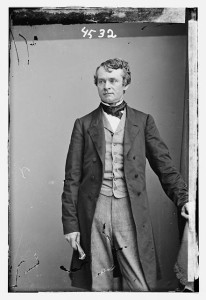150 years ago today, as the Battle of Chancellorsville continued, President Lincoln assuaged the fears of Pennsylvania Governor Curtin: the rebels weren’t threatening his state – no need to call out the militia.
From The Papers And Writings Of Abraham Lincoln, Volume Six:
TELEGRAM TO GOVERNOR CURTIN.
WAR DEPARTMENT, WASHINGTON, April 28, 1863.
HON. A. O. CURTIN, Harrisburg, Penn.:
I do not think the people of Pennsylvania should be uneasy about an invasion. Doubtless a small force of the enemy is flourishing about in the northern part of Virginia, on the “skewhorn” principle, on purpose to divert us in another quarter. I believe it is nothing more. We think we have adequate force close after them.
A. LINCOLN. …
TELEGRAM TO GOVERNOR CURTIN,
EXECUTIVE MANSION, MAY 1, 1863
GOVERNOR CURTIN, Harrisburg, Penn.:
The whole disposable force at Baltimore and else where in reach have already been sent after the enemy which alarms you. The worst thing the enemy could do for himself would be to weaken himself before Hooker, and therefore it is safe to believe he is not doing it; and the best thing he could do for himself would be to get us so scared as to bring part of Hooker’s force away, and that is just what he is trying to do. I will telegraph you in the morning about calling out the militia.
A. LINCOLN,
TELEGRAM TO GOVERNOR CURTIN
EXECUTIVE MANSION, MAY 2, 1863
GOVERNOR CURTIN, Harrisburg, Penn.:
General Halleck tells me he has a despatch from General Schenck this morning, informing him that our forces have joined, and that the enemy menacing Pennsylvania will have to fight or run today. I hope I am not less anxious to do my duty to Pennsylvania than yourself, but I really do not yet see the justification for incurring the trouble and expense of calling out the militia. I shall keep watch, and try to do my duty.
A. LINCOLN P. S.—Our forces are exactly between the enemy and Pennsylvania.
Meanwhile, after a quiet day during which some men in the NY 33rd Volunteers visited the exact spot where little George Washington felled his father’s cherry tree, the regiment crossed the Rappahannock below Federicksburg. From The story of the Thirty-third N.Y.S. vols.; or, two years campaigning in Virginia and Maryland (by David W. Judd (page 287-289)):

